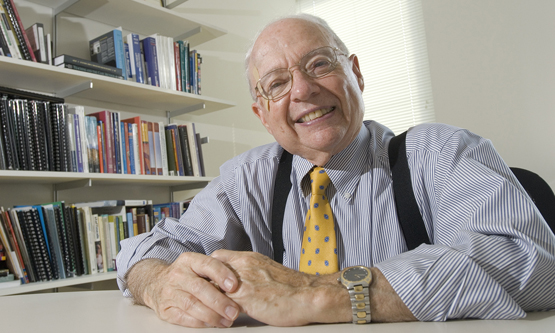Mass. Casinos: A Crap Shoot?
SHA professor says people should get the gambling they want

For the past few months, Massachusetts Governor Deval Patrick has been pushing hard for legislative changes that will permit casino gambling in select locations in Massachusetts. Patrick argues that three casinos could generate 20,000 jobs and $400 million in annual tax revenue, and last week he included some of that projected windfall in a proposed $28.2 billion state budget — even though his agenda to legalize gambling has many powerful critics, such as fellow Democrat Salvatore DiMasi, the speaker of the state’s House of Representatives. Like others who oppose legalized gambling, DiMasi says Patrick’s projections of a casino windfall are vastly inflated. He also argues that any financial gain would be washed away in a rising tide of gambling addiction and crime.
Who will win the legislative game? Last semester, BU Today published the opinions of Metropolitan College’s Daniel LeClair, a professor and chairman of the urban affairs, city planning, and criminal justice department. LeClair said he’s betting on Patrick, although he’s not putting real money on it — or on any other wager. “I don’t like gambling,” he said. “I can’t imagine anybody throwing their money away.”
For another take, we recently spoke with Stanley Buchin, an associate professor at the School of Hospitality Administration and a former marketing and business consultant to several casino developers.
BU Today: What do you think of the governor’s projections of revenues from gambling?
Buchin: I haven’t looked at all of the projections, but after looking at the Massachusetts Taxpayers Foundation report and comparing the casinos they want to build here with those that have been built in Connecticut in terms of size and revenues, the numbers seem reasonable. The casinos in Massachusetts would be closer to where most of the population lives, so I have every reason to believe that they ought to do as well as the Connecticut casinos have. The Mohegan Sun is now the larger of the two Connecticut casinos, and for a long time Foxwoods was the largest-grossing casino in the world.
What about the critics’ argument that casinos aren’t legitimate economic development, because they merely divert discretionary spending that would otherwise go to restaurants and other forms of entertainment?
I think that fear is largely based on the negative community experience in Atlantic City. But Las Vegas has been a very different story. The local businesses in Las Vegas have been stimulated by all the conventions and tourists. I think if there’s more openness and willingness on the part of local businesspeople and casino operators to work with one another, casinos can have quite a positive impact.
But I also think that to the extent that the casino industry here becomes a quick day trip, it probably will not be as much help to the local businesses, at least compared to what would happen if the casinos can really develop as leisure destinations for people coming here from outside Massachusetts. Boston is obviously a very attractive destination for visitors from all over the world, and a casino would be just one more attraction.
Do you agree that gambling is likely to attract more crime to nearby communities?
There are issues about whether or not it’s going to attract organized crime, because money attracts criminals, but in my observation, the people I’ve worked with in Las Vegas and Atlantic City have been pretty straight up. But we have to be sensitive to this issue, and we need to keep an eye on it. We’re going to need a very strong casino control commission to make sure that the wrong people are not getting into positions of power in the casinos.
Do you worry about people becoming addicted to gambling?
Gambling addiction is not my area of expertise, but I can say that if somebody living in Massachusetts is addicted to gambling, he or she has lots of opportunities to gamble. All you have to do is walk down to your corner grocery or go and watch horses race or even bet online. So if we were a society that had no other opportunities to gamble, these proposed casinos would probably contribute much more to the potential for addiction. You can only go so far to protect people from themselves. Just go to a casino and watch the people. They’re really enjoying themselves. And boy, there’s little enough of that in life.
Would we be better off with casinos out in the boondocks or in the city?
I think you want to make casinos as convenient as possible. And I mean for local residents as well as tourists. They should be convenient to Logan Airport, the Boston Convention Center, and the residents of Boston. I don’t think you want to punish people by putting them as far away as possible. If we’re going to have them we may as well have something that generates as much revenue and jobs as possible.
Back to the legislative battle: who do you think will win?
I have no idea. I have decided that I’m not a very good predictor of how the legislature is going to act. I will say that it depends on how successful the governor is in gathering his forces and putting pressure on the legislature. It’s not going to happen without somebody taking strong leadership on it.
Chris Berdik can be reached at cberdik@bu.edu.
Comments & Discussion
Boston University moderates comments to facilitate an informed, substantive, civil conversation. Abusive, profane, self-promotional, misleading, incoherent or off-topic comments will be rejected. Moderators are staffed during regular business hours (EST) and can only accept comments written in English. Statistics or facts must include a citation or a link to the citation.